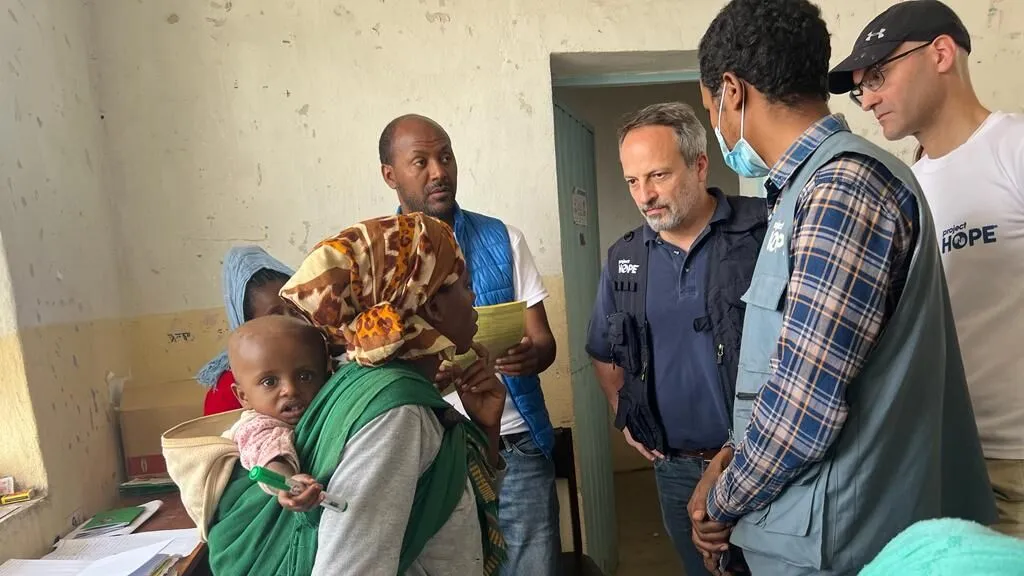Project HOPE Sounds Alarm for Humanitarian Crisis in Ethiopia
Relief organization boosting number of mobile health clinics and urging more robust international response

Washington, D.C. (June 23, 2022) – Project HOPE’s CEO, Rabih Torbay, who recently returned from Ethiopia, is urging the international community to step up its humanitarian assistance in that country, where more than 20 million people are in need of food assistance due to ongoing drought, conflict, and displacement.
During the 1980s, the humanitarian catastrophe in Ethiopia—arguably the worst of the 20th century—spurred a global response through benefit concerts and other charitable drives. Today, the country, and large swaths of the African continent, is again suffering from a deadly mix of regional conflicts, widespread displacement, and devastating droughts brought on by climate change. Global inflation and spiraling costs for food, transportation and the like are exacerbating hardship. The United States Agency for International Development’s Famine Early Warning Systems Network indicates that humanitarian assistance needs are being propelled to record levels—nearly 40% higher than recent years.
“I have been involved with humanitarian aid efforts for decades, and yet the situation in Ethiopia surprised me—it is far worse than I expected. We must sound the alarm about the conditions there, and address them, now,” said Torbay. “It is not enough to keep people alive just to die another day; a more robust international response is needed to lift them out of extreme poverty and hunger, prevent more disease outbreaks, and avert a massive loss of life.”
Project HOPE, a global health and humanitarian assistance organization, implements a range of relief programs, particularly in Northern Ethiopia, focused on improving reproductive, maternal, newborn, and child health and combating the spread of HIV/AIDS and COVID-19. Notably, Project HOPE is increasing the number of mobile health and nutrition teams that it has deployed in remote communities far from care to provide essential drugs, vaccines, medical supplies, and Ready-to-Use Therapeutic Foods (RUTF).
However, the situation on the ground remains dire. Global supply chain disruptions are contributing to inflation and rising fuel and food prices undercut everyday activities, severely disrupting the lives of Ethiopians while compromising the work of humanitarian aid organizations like Project HOPE. For example, Torbay learned that many Ethiopian women have stopped taking their antiretroviral medications to treat HIV because they lack food with which to take them.
Meanwhile, extreme shifts in weather patterns have yielded both heavy rains and sustained drought that have destroyed essential crops like corn and millet and resulted in extensive livestock losses. Some health facilities in Ethiopia, many of which lack equipment and supplies to provide basic health and nutrition services, have been damaged and looted because of the conflict. And security concerns related to the conflict have suspended some humanitarian efforts.
An estimated 4.5 million people are now displaced. More than 1.23 million children under the age of 5 are severely malnourished while an additional three million are considered moderately malnourished. Malaria and vaccine-preventable diseases like mumps and measles are spreading, with increases in cases of cholera likely. Pregnant women and children are especially vulnerable, and women are subjected to increased health threats as well as sexual violence.
“I understand that the crisis in Ukraine holds the international community’s attention, but Ethiopia is poised on the brink of collapse, and we cannot afford to let millions upon millions of people fall victim to drought, disease, and looming famine,” said Torbay. “We must use all available tools to alleviate the pressures bearing down on Ethiopia and save lives.”
Although USAID’s recent commitment of $100 million is a critical lifeline to provide emergency relief to this crisis, we echo their words—it is not enough. The international community needs to increase financial contributions and economic relief to Ethiopia, and release reserves of gas, oils, and grains in the interest of forestalling further disaster.
Project HOPE offered these recommendations for addressing food insecurity in Ethiopia:
- Remember that, in addition to cases of Severe Acute Malnutrition, people who are moderately malnourished are at risk of becoming severely malnourished and also need to be prioritized.
- Remain focused both on the population’s nutritional needs and other aspects of health, including routine vaccination, pre- and post-natal care, and water, sanitation and hygiene.
- Maintain the progress that the Government of Ethiopia and the international community have made on fighting HIV/AIDS, maternal and infant mortality and vaccine-preventable diseases.
- Double down on efforts by the Government or Ethiopia and the international community to resolve the different conflicts in the country and ease some of the ethnic tension that is leading to displacement and suffering.







